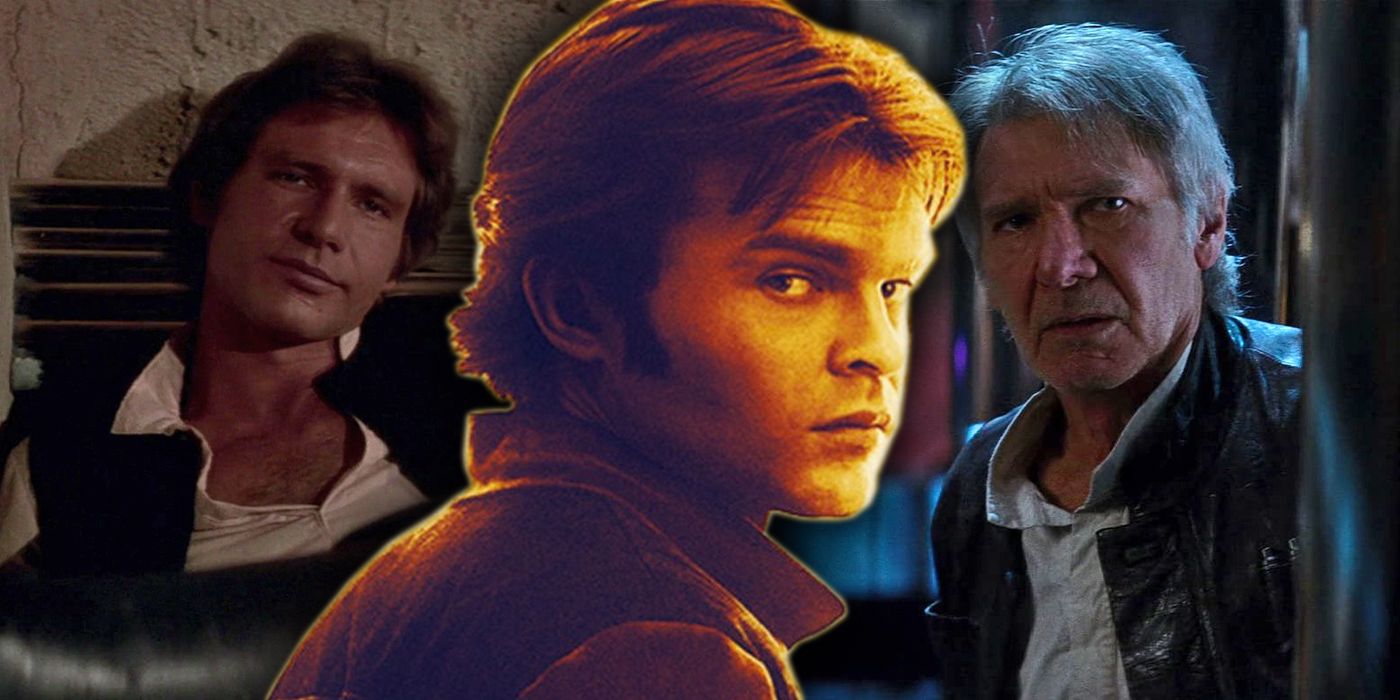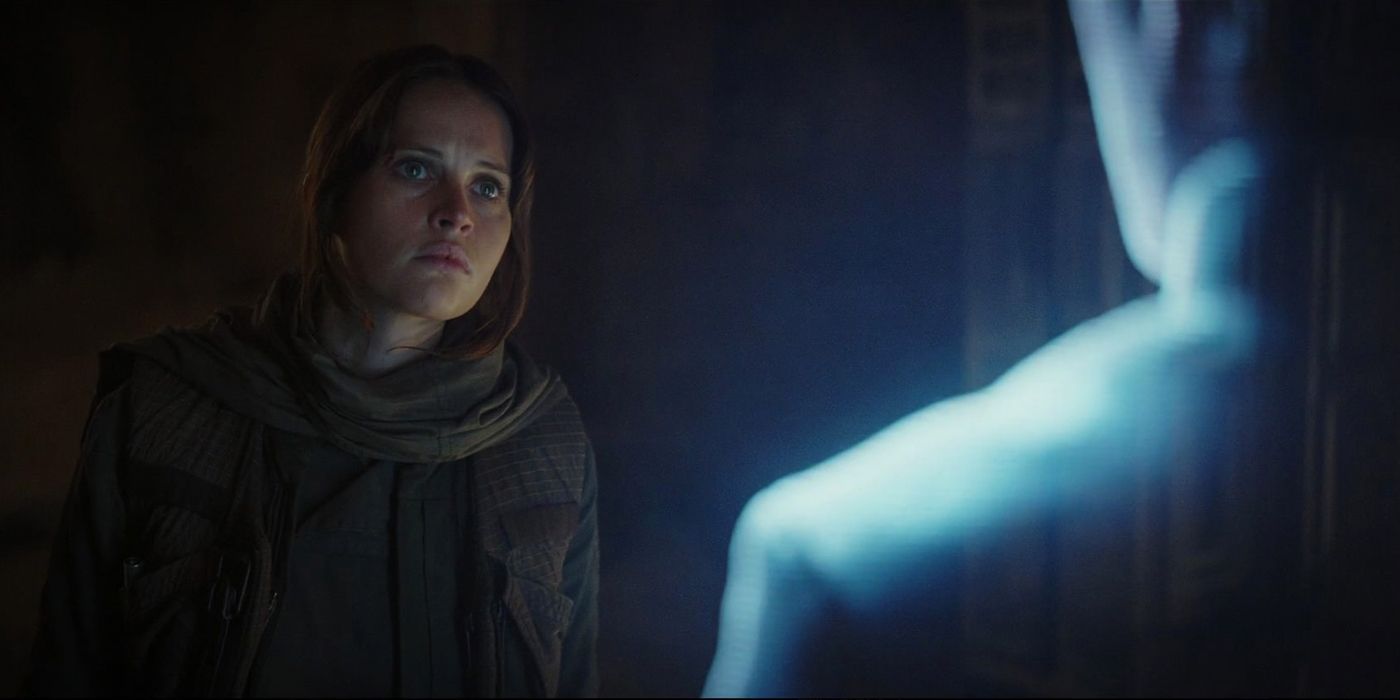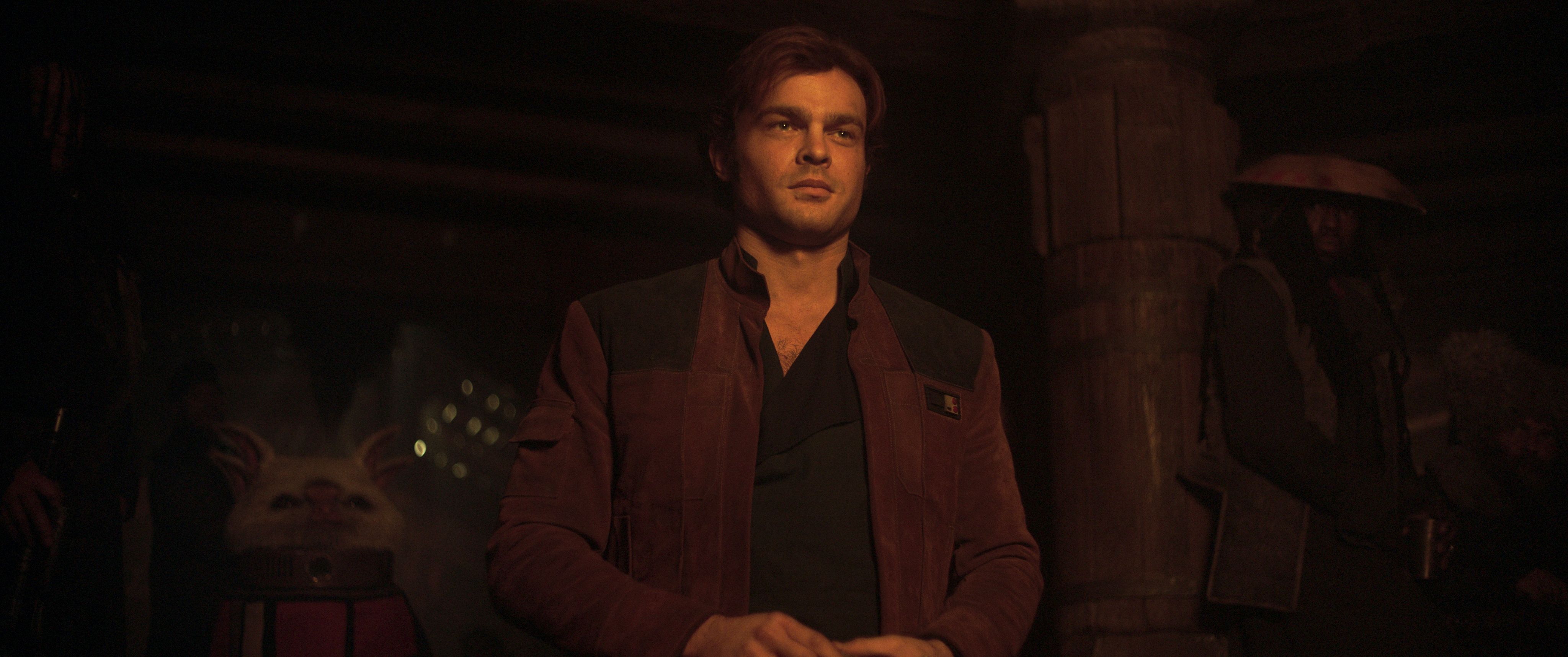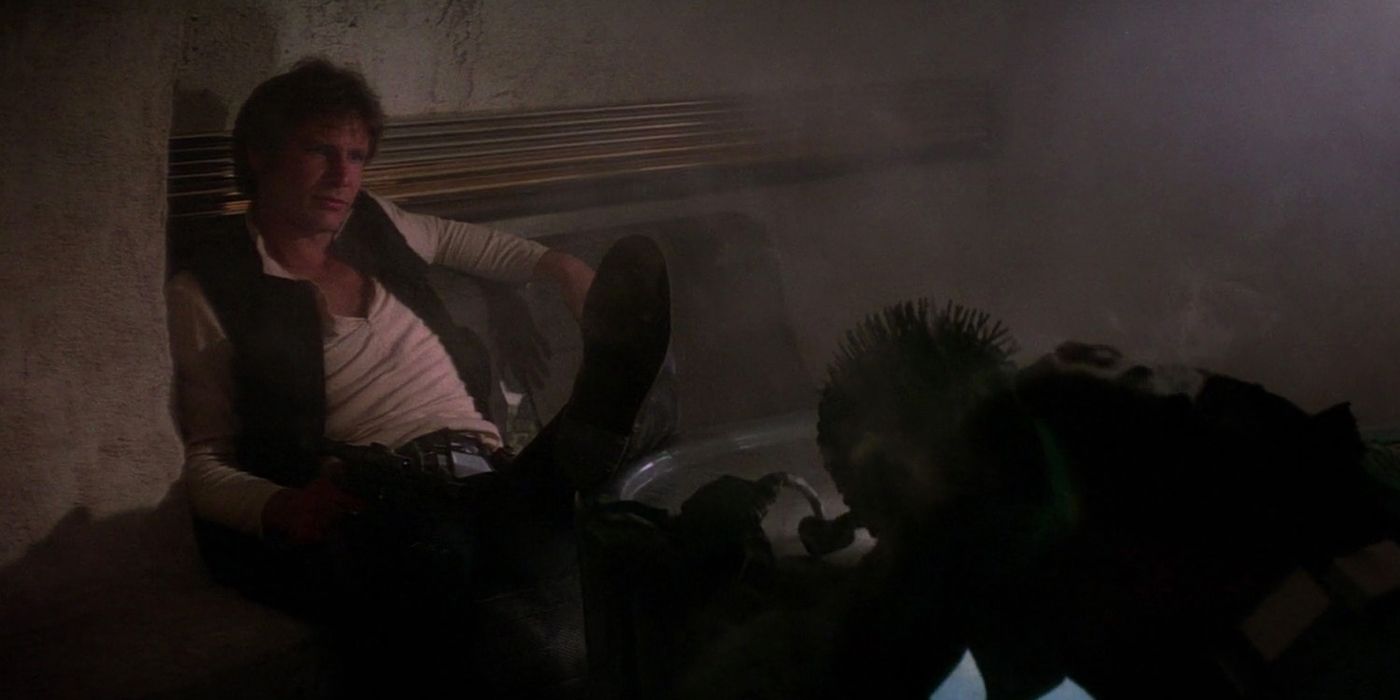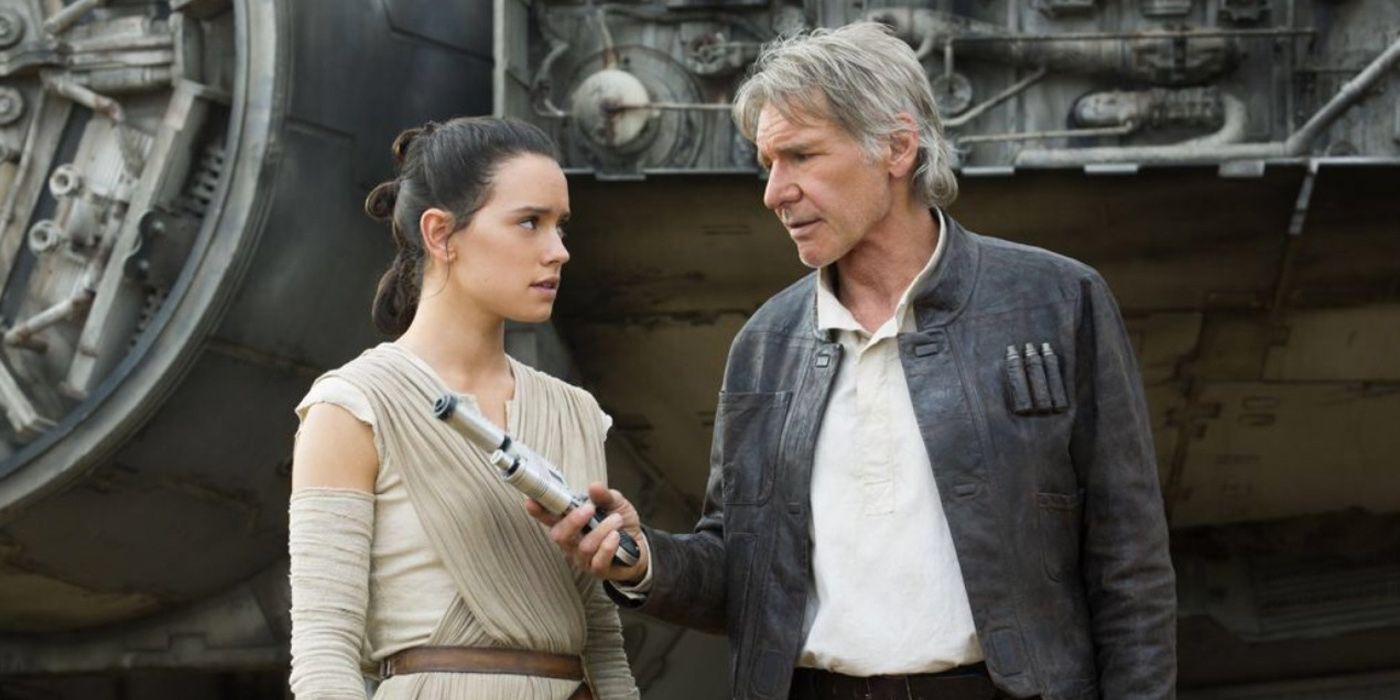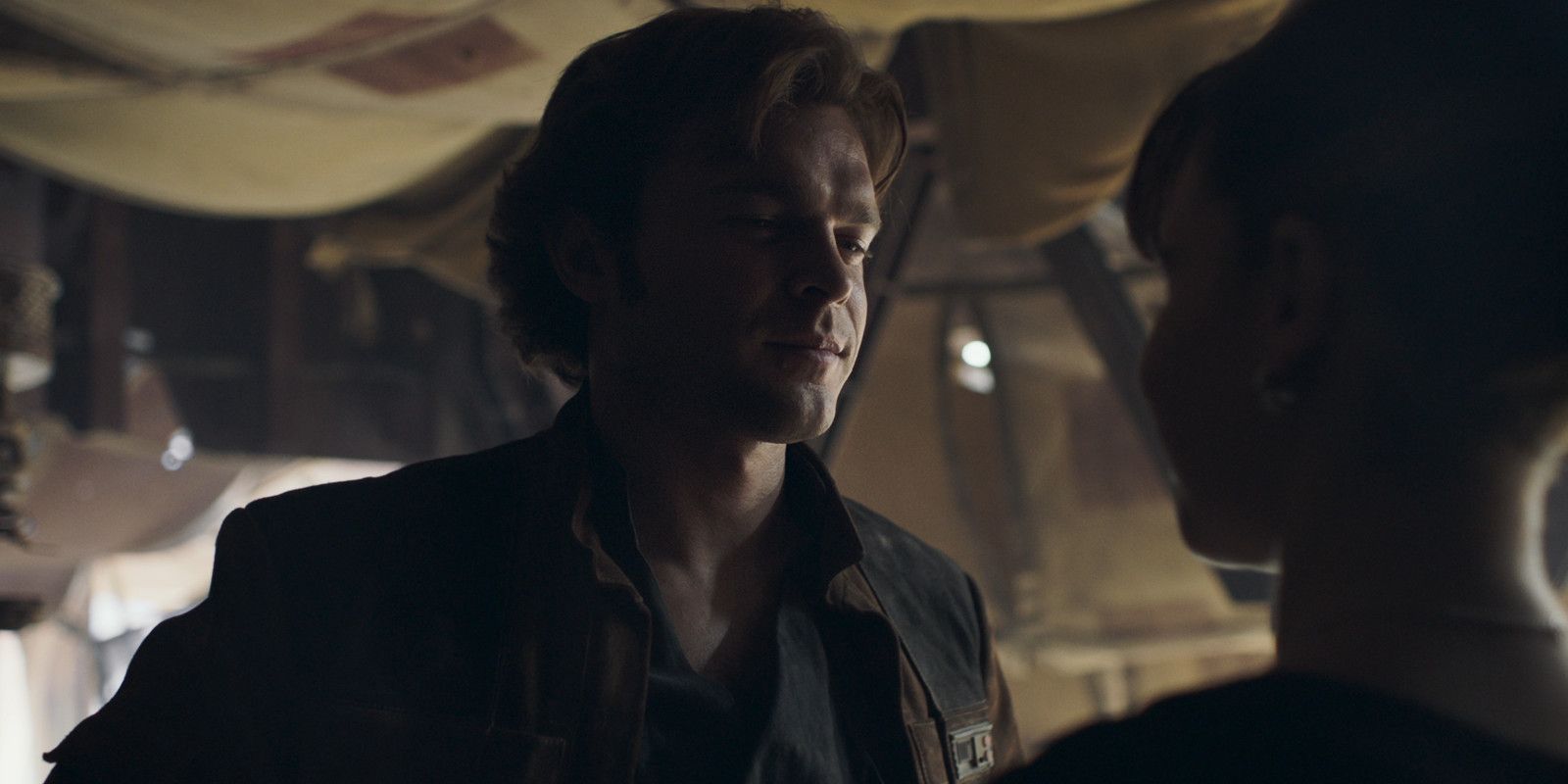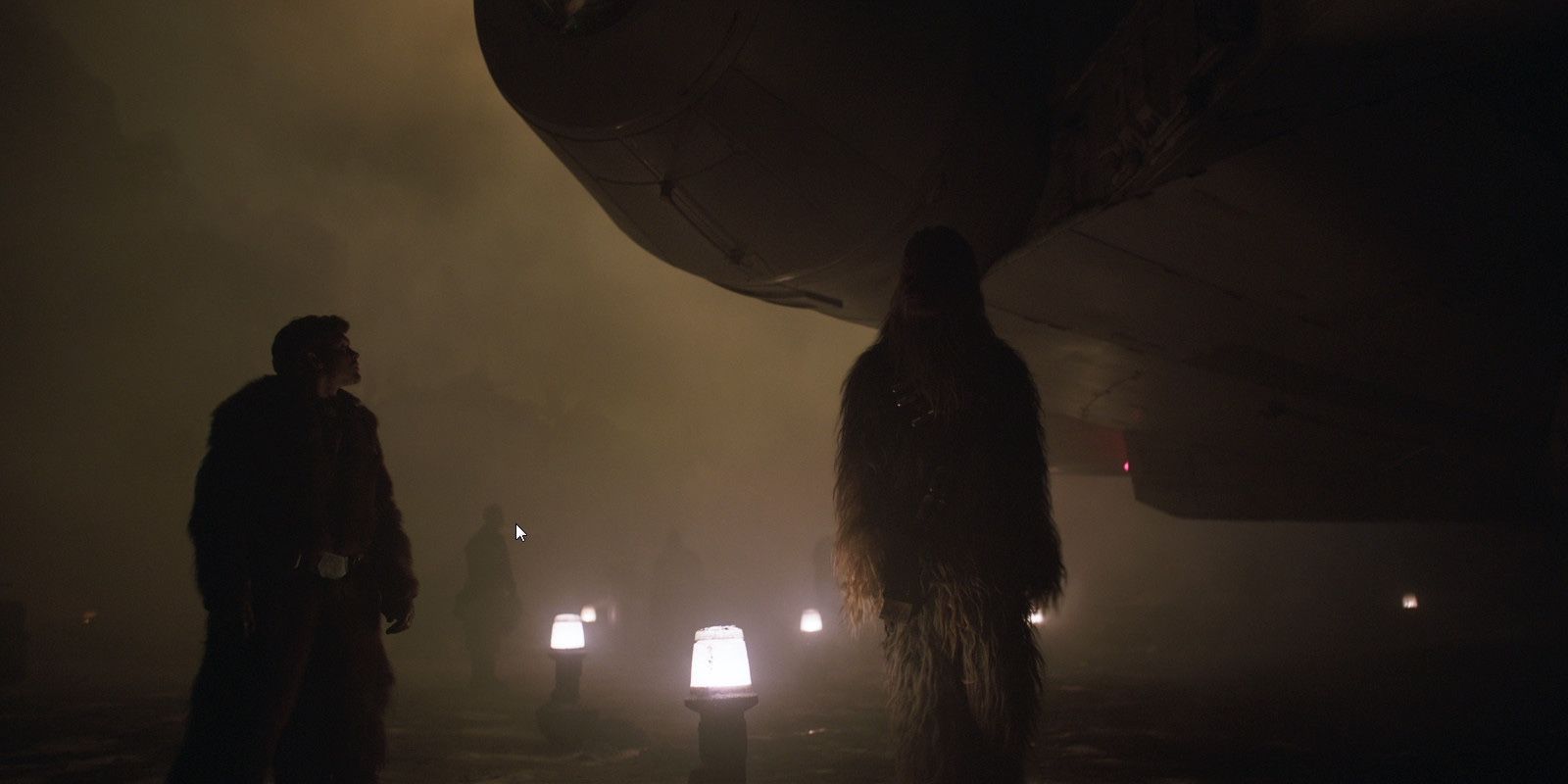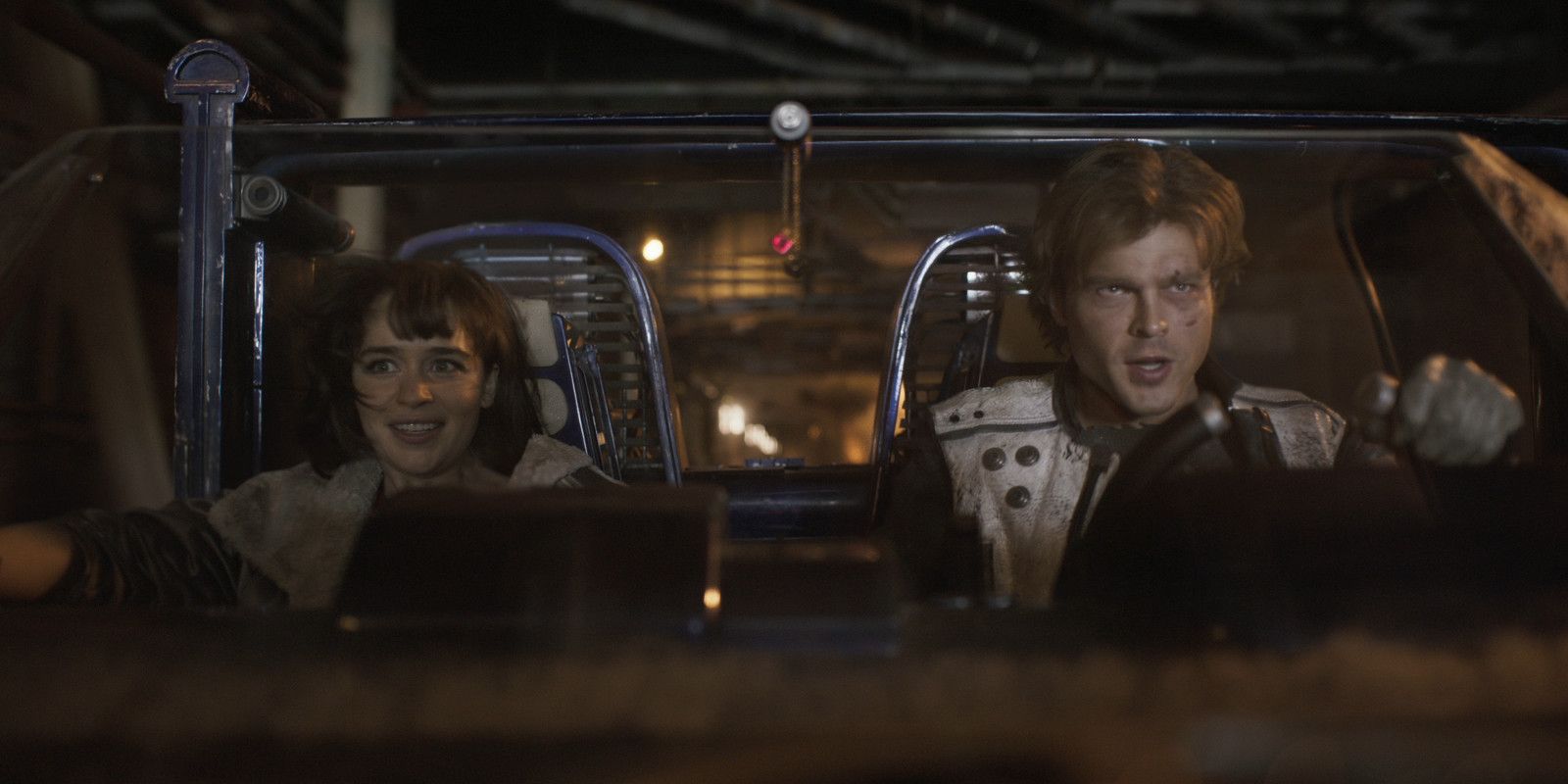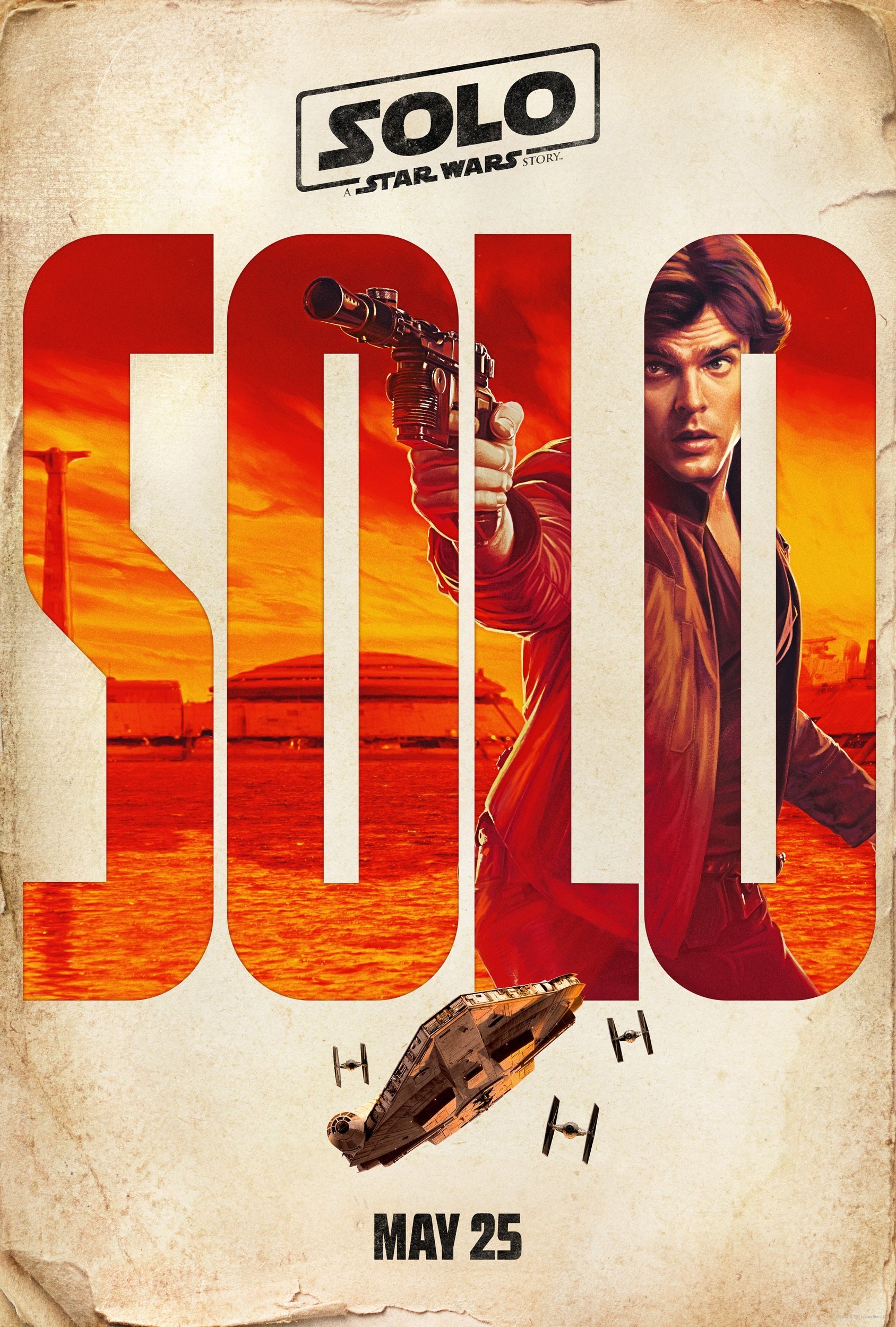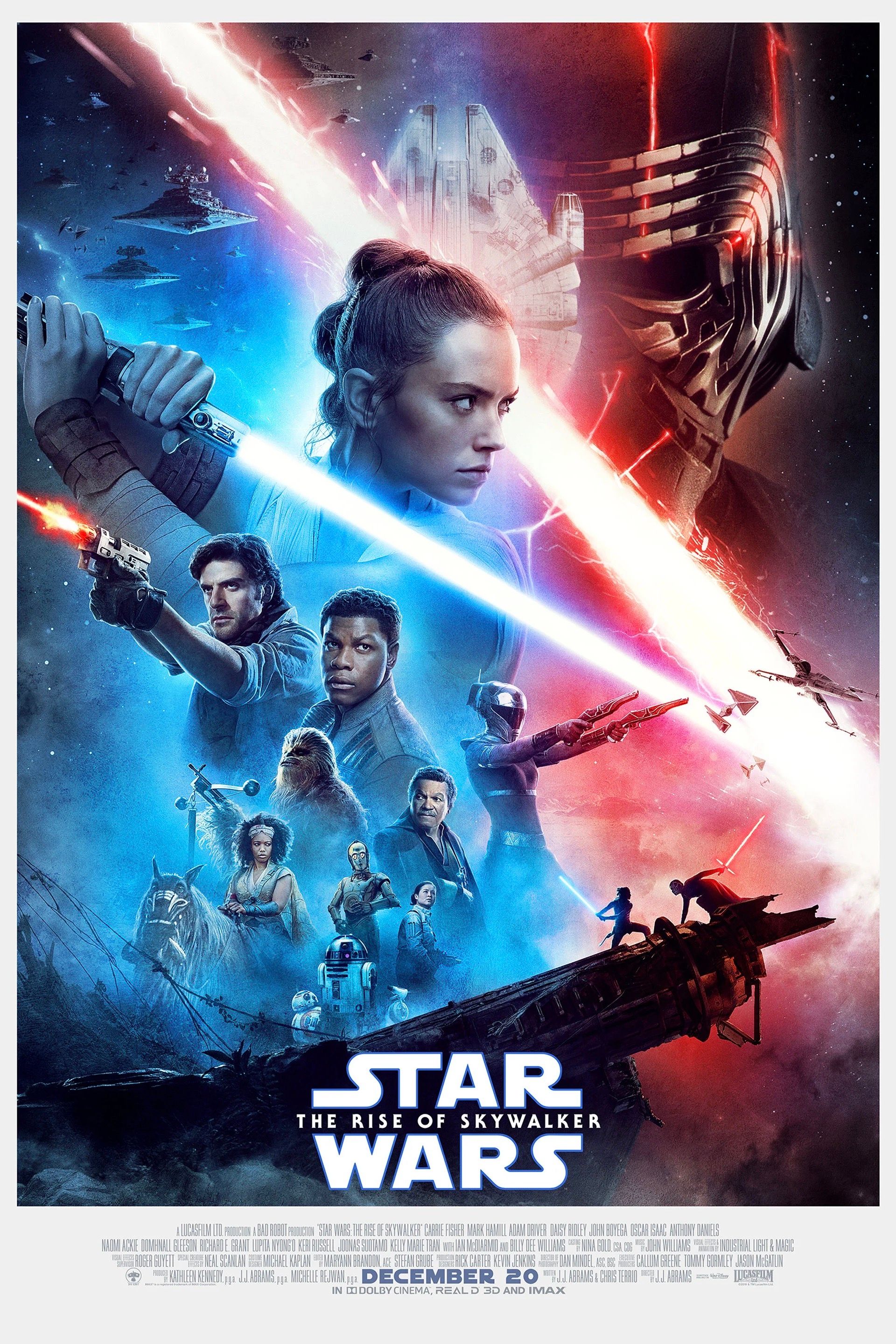[Update: Reposted from April 12th for #StarWarsDay 2018. May the 4th be with you!]
Solo: A Star Wars Story is going to be making a lot of changes to how audiences view the self-famed smugger, but they may not be prepared for just how much Ron Howard's young Han prequel is going to reframe Harrison Ford's iconic character.
Solo is, of course, going to be filling in a lot of Han's background. Already from the trailers, we've seen his early relationship with Chewbacca and Lando, acquiring his trademark blaster, taking on the Kessel Run and plentiful other hints. The biggest perception shift so far comes in the form of the Millennium Falcon, which is in a much better state than in the subsequent movies (it's also likely yet to have its final droid brain uploaded). Needless to say, there's going to be a lot of ground covered.
Related: Every Upgrade' Made To The Millennium Falcon in Solo: A Star Wars Story
But all of these are elements that surround Han and say nothing of the man himself. While Alden Ehrenreich's casting and performance (and acting coach) have been some of the most hotly discussed aspects of Solo's production this side of Lord and Miller, we know little about what this early-twentysomething is actually like; he's quipped well in the full trailer, but there's little beyond being cocksure. And that may be because, when you drill down, Han's true character is a lot more complex and internally conflicted than the "uber cool" exterior tends to let on.
If Solo really is diving deep, then it's got a big personality contradiction to work with - and that may be the entire point of the film.
- Page 1: The Star Wars Stories Are About "Improving" The Originals
How Rogue One "Improved" Star Wars
Solo is the second entry in the Star Wars Story enterprise, the first non-Saga run of movies in the Disney era. Quite what the exact purpose of these is beyond extending the brand was initially unclear, especially given the freedom they have with franchise staples: Rogue One ditched the crawl, and while it worked hard to bring back actors or recreate original trilogy stars with CGI, Solo's gone for an all-in recast (albeit aided by being set ten years prior). However, based on that first outing and how Solo is shaping up, we have a good idea.
Rogue One expanded the galaxy, showing the "war" side and connecting various narrative strands to fill out some key backstory to the main Saga; the Rebel Alliance's first victory from Star Wars' opening crawl. Within that, it addressed a long-standing fan discussion: why the Death Star had a fundamental flaw in the first place. As detailed in the film, Galen Erso, the superweapon's architect, had planted a trap in the space station's reactor system that if hit would start a chain reaction that would bring the whole thing down.
Read More: Rogue One Resolves A 40-Year Old Star Wars Plot Hole
This wasn't exactly a plot hole to begin with (Empire hubris was and remains a fair enough explanation) and providing this clarification wasn't what made Rogue One great, yet it did add to the bigger picture and was evidently part of the decision to make the film; the explanation, along with the rest of the world expansion, made the original Star Wars a stronger piece of the canon. It thus seems that the Star Wars Stories are about - alongside making good movies, obviously - canon improvement; they're banner tales that feel like some old school Expanded Universe adventure, giving depth to something previously ambiguous.
What Is Solo Adding to Star Wars?
It's important to note that, in the early days of Disney Star Wars, Solo was going to come first. It (along with a Boba Fett-related movie) were the earliest rumored non-sequel projects from the rejuvenated Lucasfilm (in fact, Solo was in the works before George Lucas sold the company), with Rogue One only added to the docket years later. So, in one version of the plan we got Han before Jyn, which puts an onus on what exactly Solo is going to be changing regarding the character.
Of course, we know it's going to be filling a lot of gaps; already in this article, we've touched on some big ones, and it seems likely that pretty much any line from the originals that touches on Han's past will be given a new meaning - from "I've made a few special modifications myself" to "Chewie and me got into a lot of places more heavily guarded than this". But that's all inference from trailers. Where's the Death Star weakness? Disney CEO Bob Iger has said we'll see how Han got his name, and now the confusion of whether he was being literal or not (he wasn't) has worn off, we have to ask: who is Han Solo?
Han Solo Changed Across The Original Trilogy
Han Solo is a hard character to pin down, mainly because for the constant snarkiness he's always changing. Broadly he's the rogue with a heart of gold - the ultimate ironic "solo" - but the variations on that idea are many.
Related: Solo: A Star Wars Story Character Guide
From the start, there were layers of presentation with Han. He enters as a master of bravado in the Mos Eisley Cantina (an early edit introduced him sneaking a kiss from one of two dates), yet already part of that was revealed to be a front when his cool dropped in place of relief the moment Luke and Obi-Wan left. Throughout the rest of the adventure he was motivated by self-preservation first and financial gain a close second - with copious "role breaking" - right up until the end where the experiences with Luke and co. softened him and he saved the day (albeit still retaining his sarcastic view for the award ceremony).
The Empire Strikes Back maintained that ending status quo in general, with Han altruistic to a point but also a repeatedly-affirmed scoundrel and a proper flirt to boot. This did drop a bit with his growing affections for Leia, but he was still very much the "bad boy" of the main trio. However, one carbonite hibernation later, and the rough edges were sanded off to give a more straight-up hero who occasionally made sardonic remarks. As Return of the Jedi's stature amongst Star Wars canon as waned, this aspect of Han - presumed to be a result of the majority of the creatives involved wanting him killed off and having nowhere they desperately wanted to go with the character - has become a key point of contention.
Of course, nothing was as contentious as "Han Shot First". For the Special Edition of Star Wars (now titled Episode IV), Lucas re-edited the Greedo showdown to have the rodian shoot and Han's killing blow come second (he later redid it again to have them fire simultaneously for the DVD). Many will argue this minor change (especially compared to other CGI alterations) makes Han less morally ambiguous and more agreeable from the off, but it really fits with the ever-shifting facade he had at the start of A New Hope that gradually normalized across the trilogy.
Everybody thinks they know Han, but there's a lot more variation to him than is conventionally accepted, and the confusion centers on - albeit somewhat retroactively - A New Hope. This actually makes him ripe for exploration. In fact, it's a process Disney has already started.
Related: The Origin Of Han's Gold Dice Will Tear You Apart
Disney Has Already Started Creating A New Arc For Han
Han in The Force Awakens was both expected and not. His entrance was pure Solo without any of the aforementioned confusion - in a word, cool - but it gradually emerged he had a tortured backstory. From post-humous discussion in The Last Jedi, we know he wasn't too hot on son Ben being trained by Luke, and Kylo Ren's subsequent turn to the dark side broke him fundamentally. He left Leia and "went back to the only
thing I was ever good at". Those are his own words, and so we take that as how he views himself; he was always at heart a no-good smuggler who betrays any and everyone for his own gain, self-preservational and financial.
But he did care. He still loved Leia and only didn't stay out of regret. When things boiled down to it, he was brought back to the fight - not before trying to mentor similar lost-but-well-meaning soul Rey - out of not self-preservation or money, but because it was the right thing; he fought for the Resistance, and later sacrificed assured safety for the eventually fatal move of trying to save his son. His death is tragic because he was doing the right thing for the right reasons, a resolution of that constant confusion we'd had since his first appearance.
This is fitting in its own way, but says a lot about how Disney-era Lucasfilm and Kathleen Kennedy - who has applied similar "who are they" goggles to Luke Skywalker in The Last Jedi - view Han Solo. He went back to smuggling, but was doing so as a shield; it was unwanted, begrudging punishment, not who he really was. And that "really" element is where Solo comes in.
Who "Is" Han In Solo?
Solo is about Han, and anybody who thinks otherwise - that the secondary cast, even Glover's Lando, are in anyway more important - will find themselves rudely mistaken on May 25. It's about how Han became Han, evidenced by the project's genesis. What may confuse matters is that we've seen and heard very little about Ehrenreich's performance. This has regularly being chalked up to trepidation about his role and the acting coach rumors, but it may be that this early Han is going to be a little... different.
Related: Alden Ehrenreich Was The Right Choice for Young Han Solo
The most information we've got came from Entertainment Weekly's exhaustive cover story on Solo from early February, conducted by Anthony Breznican. From the first sentence, it was clear something was up:
"Han Solo just can't help being a good guy ” much to his disappointment. Try as he might to live outside the law, to care about nothing, to embody his loner name, he finds himself inexorably pushed and pulled by the tractor beam of his own decency. Just when you think he's gone forever, he comes back to save the day."
While these are the words of Breznican derived from his interviews with cast and crew, they are presumably approved by Lucasfilm, and are reflected in the words of Ehrenreich, who describes his character as "an idealist" who is "pursuing a dream" that is "a lot harder than he had imagined". Emilia Clarke (who we are going to have to come back to) says Han will "hone his cynicism over time".
Young Han Solo Is Very Different
That is not the Han we have discussed based on any of his previous four appearances in Star Wars. Something is different, and it points in a very clear direction that consolidates all the previous appearances into one coherent whole, with Solo the first act of a bigger journey. It appears Han started out a good guy trying to do bad, wanting to be the all-out scoundrel he presents in A New Hope but having that heart of gold always burst out; as he says in the latest trailer, he's "waited a long time for a shot like this", yet when put up against it has a "good feeling", directly opposing the classic Star Wars one-liner. He's more good, closer to that Return of the Jedi end-point than fans ever realized. What happens in the film, then, is a fall from grace.
Related: Solo: A Star Wars Story Can Beat The Hate
This changes everything. It makes The Force Awakens a return to not his Episode IV start point rather his Solo beginnings, but also means the original trilogy was in many ways a redemption. It saw him come back from being a forced-hardened crook to being the hero he always was underneath. That's a strengthening piece of backstory that reworks without retconning - Ehrenreich said "the Kasdans did a wonderful job of kind of retroactively coming up with what kind of background would lead him to becoming the character we all know" - that justifies making this movie more than a blue-and-white Falcon ever could.
This is more in line with what we've come to expect after Rogue One. We'll learn an origin for Han that clears up long-standing and underlying confusion while giving his initial arc a greater sense of victory; that return at the end of A New Hope is a triumph of a good man. It also serves as a neat slice of meta-commentary on Star Wars fandom and idealism, something that has been prevalent throughout Disney's time with the franchise (not least in Han's angry fanboy son, Kylo Ren).
But, if we are saying Han is a "good guy" trying to do bad who then comes to believe his scoundrel ways, then what makes the man Ehrenreich and Breznican describe go off track in the first place?
What Changes Han?
In the full trailer, Han's mentor Beckett says to his ward, "assume everyone will betray you, and you will never be disappointed". That immediately feels prophetic of Han's dreams coming up against the harsh reality; to be the scoundrel takes its toll and requires him to become that hardened man for real... or so he thinks. Here's where the presumed lack of Boba Fett and Jabba the Hutt really shine; Solo can break its hero with something new.
Related: How R2-D2 and C-3PO Could Still Cameo In Solo
Now, it could be Beckett or even Lando that tip Han over the edge, but we're inclined to suggest the ultimate turning point is someone more intimate: Qi'ra, the film's female lead and most important character not from the original trilogy. From the marketing, it's clear she and Han have a long-standing friendship - they raced pod-cars on Corellia before reuniting for Dryden Vos' mission years later - making her the biggest link he has to his childhood. And, per Clarke, the big difference between the pair is that "she's better at working the system rather than bucking against it". They intrinsically linked, and things aren't exactly set up for them to have an amicable parting when the moment comes.
Whether it's by her death or a more Vesper-style betrayal, it's conceivable she will be the final straw that sets Han on the rogue track. That would be a big enough push given their past and fits the "retcon" aspect of a Star Wars Story, deepening Han's brutish romantic behavior and subsequent dependency on Leia in the future (not to mention giving his and Chewie's friendship a greater mutality than a Life Debt ever could).
-
"Han Shot First" is one of the most controversial changes ever made to Star Wars, yet the softening it provided really only went to show that Han was always at heart good. With Solo: A Star Wars Story, we'll only get more of that. How it's executed - and indeed the overall quality of the film - is still up in the air, but nobody can accuse Lucasfilm of not trying to do something daring.

